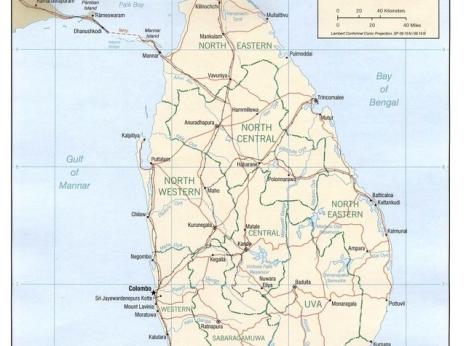Sri Lanka: Student Leaders Arbitrarily Detained

Wasantha Mudalige, the convener of the Inter-University Student Federation (IUSF), and Galawewa Siridhamma Thero, the convener of the Inter-University Bhikku Federation (IUBF), were arrested along with other 18 protesters after dispersing a protest in Colombo on 18 August 2022. While others who were arrested following the protests have been released since, Wasantha Mudalige and Galawewa Siridhamma have been detained further. On 21 August, President Ranil Wickremesinghe in his capacity as Defense Minister approved the detention order of 90 days under the Prevention of Terrorism Act (PTA). They were transferred to Tangalle Detention Center in the Southern Province of Sri Lanka. On 26 October, The Tangalle Magistrate Court ordered the Director of Terrorist Investigation Division (TID) to appear before the court for not reporting facts about the two student leaders.
Their family members and lawyer have raised concerns about the safety and deteriorating health while in detention. After multiple public requests from their family members, Galawewa Siridhamma Thero was admitted to Colombo National Hospital on 25 October after suffering from severe rash. He was diagnosed with Dengue fever.
The Sri Lankan authorities have fiercely clamped down on protests and demonized protesters during a period of economic crisis in the country. The government responded to largely peaceful protests with excessive and unnecessary force and emergency laws which gave sweeping powers to the police and the armed forces, in an effort to curb further demonstrations. Since President Ranil Wickremesinghe came into power on 21 July, over 200 protesters and protest organizers have been arrested, many under draconian anti-terror laws, with authorities routinely flouting due process, creating a chilling effect on the protest movement. President Ranil Wickremesinghe has also publicly labelled protesters as “terrorists” and “fascists”, in a bid to demonize protesters.
The PTA violates international human rights law and Amnesty International has repeatedly called for its repeal. The PTA, which allows for detention of suspects for up to a year without charge, has been weaponized to stifle dissenting voices, in contravention of Sri Lanka’s international human rights obligations, especially the right to freedom of expression and peaceful assembly. Despite the Sri Lankan government’s multiple assurances that the PTA would be reformed in line with international human rights standards, to date no adequate reforms have taken place and the PTA continues to be used as a tool to arbitrarily arrest and detain people, violate fair trial rights, and put detainees at risk of torture and other ill-treatment, amongst other violations.
The Human Rights Commission of Sri Lanka (HRCSL), in its 2016 submission to the UN Committee against Torture, highlighted the use of torture in Sri Lanka with “torture being routinely used in all parts of the country regardless of the nature of the suspected offence for which the person is arrested.” Another study conducted by the Commission, published in December 2020, found that PTA detainees faced a continuum of violence. The study documented that “violence in police custody was found to be an inherent element of the investigation process, whereby torture is inflicted to extract information, confessions, and evidence from detainees.” The UN High Commissioner for Human Rights has called on the Sri Lankan government to establish a moratorium on the use of the PTA for new arrests until it is replaced by legislation that adheres to international best practices.